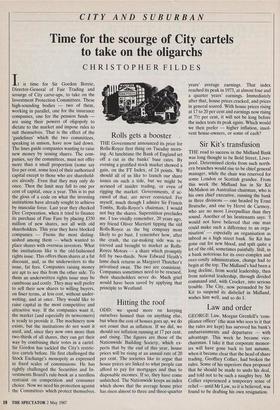CITY AND SUBURBAN
Time for the scourge of City cartels to take on the oligarchs
CHRISTOPHER FILDES
It is time for Sir Gordon Borrie, Director-General of Fair Trading and scourge of City carve-ups, to take on the Investment Protection Committees. These high-sounding bodies — two of them, working in parallel, one for the insurance companies, one for the pension funds are using their powers of oligopoly to dictate to the market and impose rules to suit themselves. That is the effect of the `guidelines' which the two committees, speaking in unison, have now laid down. The lines guide companies wanting to raise new money by issuing shares. The com- panies, say the committees, must not offer more than a small proportion (some say five per cent, some less) of their authorised capital except to those who are sharehold- ers already. Even that they may only do once. Then the limit may fall to one per cent of capital, once a year. This is to put the gloss of a code on what the investing institutions have already sought to achieve by muscular force. Last year they checked Dee Corporation, when it tried to finance its purchase of Fine Fare by placing £350 million of new shares, not all with old shareholders. This year they have blocked companies — Fisons the most disting- uished among them — which wanted to place shares with overseas investors. What the institutions like is the old-fashioned rights issue. This offers them shares at a fat discount, and, as the underwriters to the issue, fat fees. Companies raising money are apt to see this from the other side. To them an underwritten rights issue may be cumbrous and costly. They may well prefer to sell their new shares to willing buyers, on finer terms, at less cost, without under- writing, and at once. They would like to raise capital in the most competitive and attractive way. If the companies want it, the market (and especially its newcomers) is ready to provide it. The machinery now exists, but the institutions do not want it used, and, since they now own more than two-thirds of all shares, they can get their way by combining their votes in a cartel. Sir Gordon has tackled the City's restric- tive cartels before. He first challenged the Stock Exchange's monopoly as expressed in fixed scales of commissions. He has rightly challenged the Securities and In- vestments Board's rule-book as a needless restraint on competition and consumer choice. Now we need his protection against the Committees which protect themselves.


















































 Previous page
Previous page